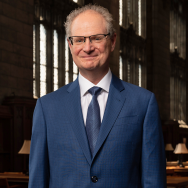This week in Norway, University of Chicago President Paul Alivisatos was honored as one of the winners of the 2024 Kavli Prize in Nanoscience, which recognized the pioneering use of nanoscale materials in the field of biomedicine.
Alivisatos was honored along with MIT’s Robert Langer and Northwestern University’s Chad Mirkin, who won the award in June from the Norwegian Academy of Science and Letters for discoveries that “contributed foundationally to the development of therapeutics, vaccines, bioimaging and diagnostics.” Today their research is used around the world to better understand principles of medicine, biology and disease, as well as medical imaging for individual patients.
“I’m honored to share this prize, not only with two scientists I admire in Robert Langer and Chad Mirkin, but also the extraordinary community of students, scholars and staff who worked in my research group to help shape the field of nanoscience,” said Alivisatos, the John D. MacArthur Distinguished Service Professor in the Department of Chemistry, the Pritzker School of Molecular Engineering and the College. “It is their work and their support, along with the institutions at which I’ve pursued this research, that made these discoveries possible.”
At a Sept. 3 ceremony held in Oslo, Alivisatos received his prize from King Harald V of Norway. The event was part of a week of activities, in which Alivisatos took part in lectures, symposia, roundtable discussions and events with this year’s Kavli Award laureates in nanoscience, neuroscience and astrophysics.
The day before the award ceremony, Alivisatos delivered his Kavli Prize lecture, in which he laid out the use of semiconductor nanocrystals for biomedical imaging, health and sustainability. He explained how these materials are used—from the analysis of tumors to optimizing sustainable crops to diagnosing plant and animal disease—and their impact on the world.
Whiskers and crystals
Alivisatos is widely regarded as a foundational figure in the field of nanoscience: the study of how materials behave at extremely tiny scales.
In the 1990s, he and his research group at the University of California-Berkeley made a number of breakthroughs using particles so small that they are called quantum dots. His group showed how to make large amounts of quantum dots, and how to use them to take snapshots of very subtle biological processes that are hard to track using other methods.
Alivisatos traces his love of chemistry back to his time as an undergraduate at UChicago, when he ran an experiment that grew tiny, whisker-shaped wires in a solution—and learned how to use these observations to understand the movement of atoms along the wires.
“For me, this idea that it was possible to know how atoms move on the smallest scale, to see them dance as it were, to explain those motions, and to use this to build things, was an inspiration,” Alivisatos recalled in an essay about the prize. “It is what I have worked on as a nanoscientist ever since. It is the picture in my mind that, through unpredictable twists and turns, led to the discoveries honored with this great prize.”
As a young professor at Berkeley, Alivisatos set about exploring the emerging field of colloidal nanocrystals. At that time, only a handful of scientists were working on the topic; today there are thousands.
Alivisatos and his lab studied how nanocrystals grew and responded to their conditions, and showed how they could be manipulated to perform tasks that were difficult to accomplish any other way, such as taking snapshots of cells and biological processes. He co-founded two companies, Nanosys, Inc. and Quantum Dot Corporation (now part of Thermo Fisher), to bring these applications into wide use. Today, the techniques and principles he developed are in use every day around the world.
“To me it is just as important a part of this story that still to this very day—each and every day—I am able to work with an incredible team of scientists, who together with me are learning how to make even better nanoparticles,” he wrote.
The Kavli Prize is presented every other year and honors scientists for breakthroughs in astrophysics, nanoscience and neuroscience that “transform our understanding of the big, the small and the complex.” Each prize includes a $1 million award split among the recipients. The prize is a partnership among the Norwegian Academy of Science and Letters, the Norwegian Ministry of Education and Research and the Kavli Foundation in the U.S.

